雅思阅读Unit 9 Music
Unit 9 I like music that I can dance to.(讲义及答案)
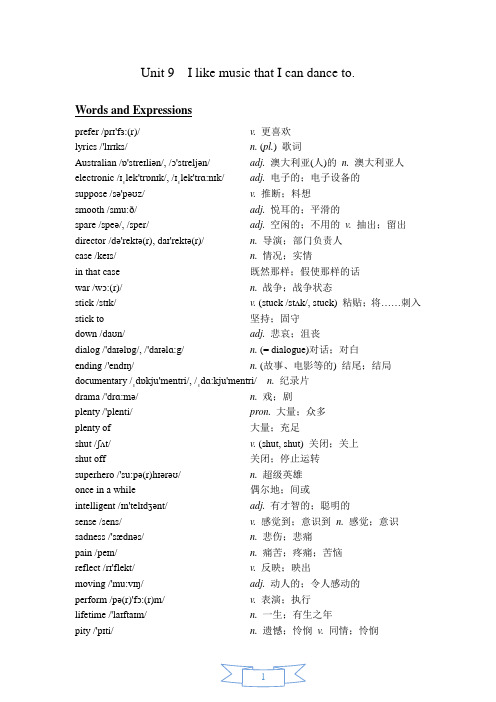
Unit 9 I like music that I can dance to.Words and Expressionsprefer /prɪ'fɜ:(r)/ v. 更喜欢lyrics /'lɪrɪks/ n. (pl.) 歌词Australian /ɒ'streɪliən/, /ɔ'streljən/ adj. 澳大利亚(人)的n. 澳大利亚人electronic /ɪˌlek'trɒnɪk/, /ɪˌlek'trɑ:nɪk/ adj. 电子的;电子设备的suppose /sə'pəʊz/ v. 推断;料想smooth /smu:ð/ adj. 悦耳的;平滑的spare /speə/, /sper/ adj.空闲的;不用的v. 抽出;留出director /də'rektə(r), daɪ'rektə(r)/ n.导演;部门负责人case /keɪs/ n. 情况;实情in that case 既然那样;假使那样的话war /wɔ:(r)/ n.战争;战争状态stick /stɪk/ v. (stuck /stʌk/, stuck) 粘贴;将……刺入stick to 坚持;固守down /daʊn/ adj. 悲哀;沮丧dialog /'daɪəlɒg/, /'daɪəlɑ:g/ n. (= dialogue)对话;对白ending /'endɪŋ/ n. (故事、电影等的) 结尾;结局documentary /ˌdɒkju'mentri/, /ˌdɑ:kju'mentri/ n.纪录片drama /'drɑ:mə/ n. 戏;剧plenty /'plenti/ pron.大量;众多plenty of 大量;充足shut /ʃʌt/ v. (shut, shut) 关闭;关上shut off 关闭;停止运转superhero /'su:pə(r)hɪərəʊ/ n. 超级英雄once in a while 偶尔地;间或intelligent /ɪn'telɪdʒənt/ adj.有才智的;聪明的sense /sens/ v.感觉到;意识到n. 感觉;意识sadness /'sædnəs/ n.悲伤;悲痛pain /peɪn/ n. 痛苦;疼痛;苦恼reflect /rɪ'flekt/ v.反映;映出moving /'mu:vɪŋ/ adj.动人的;令人感动的perform /pə(r)'fɔ:(r)m/ v.表演;执行lifetime /'laɪftaɪm/ n. 一生;有生之年pity /'pɪti/ n. 遗憾;怜悯v. 同情;怜悯total /'təʊtl/ n. 总数;合计adj.总的;全体的in total 总共;合计master /'mɑ:stə/, /'mæstə(r)/ n.大师;能手;主人v.掌握praise /preɪz/ v.&n.表扬;赞扬recall /rɪ'kɔ:l/ v.回忆起;回想起wound /wuːnd/ n.伤;伤口;创伤v. 使(身体)受伤;伤害painful /'peɪnfl/ adj. 令人痛苦的;令人疼痛的World War II 第二次世界大战Men in Black 《黑衣人》(电影名)Kung Fu Panda 《功夫熊猫》(电影名)Titanic /taɪ'tænɪk/ 《泰坦尼克号》(电影名)March of the Penguins /'peŋgwɪnz/ 《帝企鹅日记》(电影名)Spider-Man 《蜘蛛侠》(电影名)Carmen /kɑ:(r)men/ 卡门(女名)Dan /dæn/ Dervish /dɜ:(r)vɪʃ/ 丹·德维什Role-play the conversation.Jill: What are you doing this weekend, Scott?Scott: Not much. I suppose I’ll just listen to the new CD I bought.Jill: Oh, what CD is this?Scott: Well, it’s all music. There’s no singing. I like smooth music that helps me relax after a long week at work.Jill: Sounds nice. Well, if you have spare time, do you want to watch a movie with me? The director is really famous.Scott: Hmm, depends which movie. I only like movies that are funny. I just want tolaugh and not think too much. You know what I mean?Jill: Oh, in that case, I’ll ask someone who likes seriousmovies.Scott: What’s the movie about?Jill: It’s about World War II. I prefer movies that give mesomething to think about.Reading 1Read the passage. Underline the different kinds of movies and circle the movie names.What Do You Feel Like Watching Today?While some people stick to one kind of movie, I like to watch different kindsdepending on how I feel that day.When I’m down or tired, I prefer movies that can cheer me up. Comedies likeMen in Black or cartoons like Kung Fu Panda have funny dialogs and usually have ahappy ending. The characters may not be perfect, but they try their best to solve theirproblems. After watching them, the problems suddenly seem less serious and I feelmuch better again. Laughing for two hours is a good way to relax!I don’t watch dramas or documentaries when I’m sad or tired. Dramas likeTitanic make me feel even sadder. Documentaries like March of the Penguins whichprovide plenty of information about a certain subject can be interesting, but when I’mtired I don’t want to think too much. I don’t mind action movies like Spider-Manwhen I’m too tired to think. I can just shut off my brain, Array sit back and enjoy watching an exciting superhero whoalways saves the world just in time.Once in a while, I like to watch movies that arescary. They can be fun, but I’m too scared to watchthem alone. I always bring a friend who isn’t afraid ofthese kinds of movies, and it doesn’t feel so scaryanymore.Grammar Focus1.___________________________________________________________________ _____.2.___________________________________________________________________ _____.3.___________________________________________________________________ _____.4.___________________________________________________________________ _____.语法小结:一、prefer v.更喜欢I prefer music that has great lyrics.我更喜欢有优美歌词的音乐。
9unit9散文The Language of Music

A painter hangs his or her finished pictures on a wall, and everyone can see it. A composer writes a work, but no one can hear it until it is performed. Professional singers and players have great responsibilities, for the composer is utterly dependent on them. A student of music needs as long and as arduous a training to become a performer as a medical student needs to become a doctor. Most training is concerned with technique, for musicians have to have the muscular proficiency of an athlete or a ballet dancer. Singers practice breathing every day, as their vocal chords would be inadequate without controlled muscular support. String players practice moving the fingers of the left hand up and down, while drawing the bow to and fro with the right arm—two entirely different movements.Singers and instruments have to be able to get every note perfectly in tune. Pianists are spared this particular anxiety, for the notes are already there, waiting for them, and it is the piano tuner’s responsibility to tune the instrument for them. But they have their own difficulties; the hammers that hit the string have to be coaxed not to sound like percussion, and each overlapping tone has to sound clear.This problem of getting clear texture is one that confronts student conductors: they have to learn to know every note of the music and how it should sound, and they have to aim at controlling these sound with fanatical but selfless authority.Technique is of no use unless it is combined with musical knowledge and understanding. Great artists are those who are so thoroughly at home in the language of music that they can enjoy performing works written in any century.。
雅思阅读模拟试题:音乐附答案
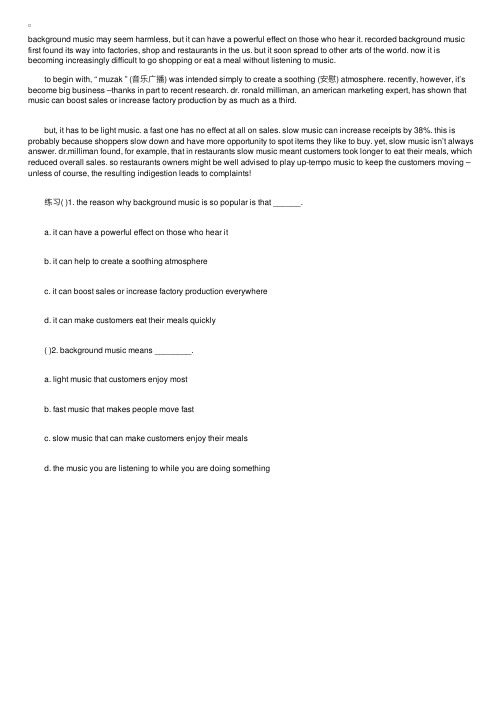
background music may seem harmless, but it can have a powerful effect on those who hear it. recorded background music first found its way into factories, shop and restaurants in the us. but it soon spread to other arts of the world. now it is becoming increasingly difficult to go shopping or eat a meal without listening to music. to begin with, “ muzak ” (⾳乐⼴播) was intended simply to create a soothing (安慰) atmosphere. recently, however, it’s become big business –thanks in part to recent research. dr. ronald milliman, an american marketing expert, has shown that music can boost sales or increase factory production by as much as a third. but, it has to be light music. a fast one has no effect at all on sales. slow music can increase receipts by 38%. this is probably because shoppers slow down and have more opportunity to spot items they like to buy. yet, slow music isn’t always answer. liman found, for example, that in restaurants slow music meant customers took longer to eat their meals, which reduced overall sales. so restaurants owners might be well advised to play up-tempo music to keep the customers moving –unless of course, the resulting indigestion leads to complaints! 练习( )1. the reason why background music is so popular is that ______. a. it can have a powerful effect on those who hear it b. it can help to create a soothing atmosphere c. it can boost sales or increase factory production everywhere d. it can make customers eat their meals quickly ( )2. background music means ________. a. light music that customers enjoy most b. fast music that makes people move fast c. slow music that can make customers enjoy their meals d. the music you are listening to while you are doing something。
音乐的力量(雅思阅读机经)
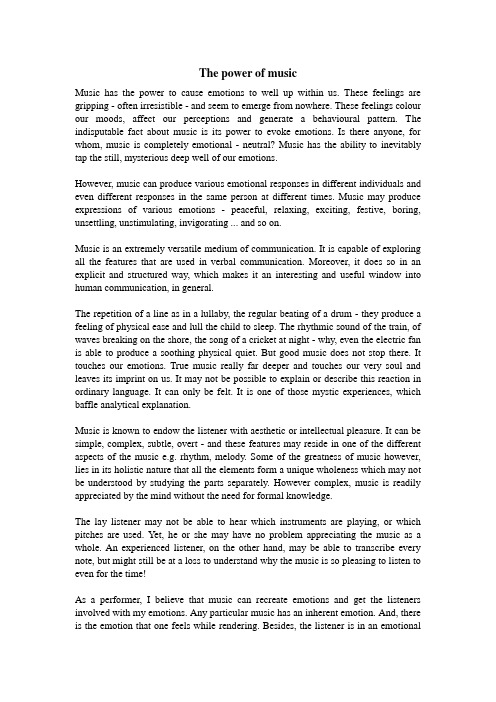
The power of musicMusic has the power to cause emotions to well up within us. These feelings are gripping - often irresistible - and seem to emerge from nowhere. These feelings colour our moods, affect our perceptions and generate a behavioural pattern. The indisputable fact about music is its power to evoke emotions. Is there anyone, for whom, music is completely emotional - neutral? Music has the ability to inevitably tap the still, mysterious deep well of our emotions.However, music can produce various emotional responses in different individuals and even different responses in the same person at different times. Music may produce expressions of various emotions - peaceful, relaxing, exciting, festive, boring, unsettling, unstimulating, invigorating ... and so on.Music is an extremely versatile medium of communication. It is capable of exploring all the features that are used in verbal communication. Moreover, it does so in an explicit and structured way, which makes it an interesting and useful window into human communication, in general.The repetition of a line as in a lullaby, the regular beating of a drum - they produce a feeling of physical ease and lull the child to sleep. The rhythmic sound of the train, of waves breaking on the shore, the song of a cricket at night - why, even the electric fan is able to produce a soothing physical quiet. But good music does not stop there. It touches our emotions. True music really far deeper and touches our very soul and leaves its imprint on us. It may not be possible to explain or describe this reaction in ordinary language. It can only be felt. It is one of those mystic experiences, which baffle analytical explanation.Music is known to endow the listener with aesthetic or intellectual pleasure. It can be simple, complex, subtle, overt - and these features may reside in one of the different aspects of the music e.g. rhythm, melody. Some of the greatness of music however, lies in its holistic nature that all the elements form a unique wholeness which may not be understood by studying the parts separately. However complex, music is readily appreciated by the mind without the need for formal knowledge.The lay listener may not be able to hear which instruments are playing, or which pitches are used. Yet, he or she may have no problem appreciating the music as a whole. An experienced listener, on the other hand, may be able to transcribe every note, but might still be at a loss to understand why the music is so pleasing to listen to even for the time!As a performer, I believe that music can recreate emotions and get the listeners involved with my emotions. Any particular music has an inherent emotion. And, there is the emotion that one feels while rendering. Besides, the listener is in an emotionalstate while listening to that music - which is also important because it could be possible that this will now be linked to the emotional state of the listener. So he or she can use the song to recreate this emotion. Very often we hear people say "This is my song" and feel that special emotion again.Rhythm and melody are two facets of music that lend themselves to enjoyment in their individual capacities. The experience of beat and rhythm has a simple relation with joy, well-being and even excitement. Babies spontaneously start to rock and move when they hear music with a pronounced beat in a medium or fast tempo. By changing rhythm, we can change the aesthetic appeal of a piece of music. Even a change of tempo can cause variations in the aesthetic appeal.Similarly, melody, which is the soul of music, can create different types of feelings in listeners. Some melodies bring soulfulness, some sadness, some bring jubilance or tranquility.Music is created from the heart and moulded by emotion. As musicians, we are inherently creative - so people say - and we have the ability to derive intense pleasure from a particular piece of music, which we listen to or produce. Here, I am referring to an aesthetic experience, which everybody must have felt. Tears of joy, a tug at the heart, goose pimples... True art always comes as an irresistible inner urge. We hear a song of Thyagaraja and are enthralled just as we gaze at a majestic temple or an ancient sculpture with wonder. All such works of art are the result of an inner urge. That is why it is something inherently beautiful.... And there can be no enjoyment more impersonal and sublimating than what it offers. It prepares the very soul for something higher.。
雅思阅读第028套3-Music_Language_We_All_Speak
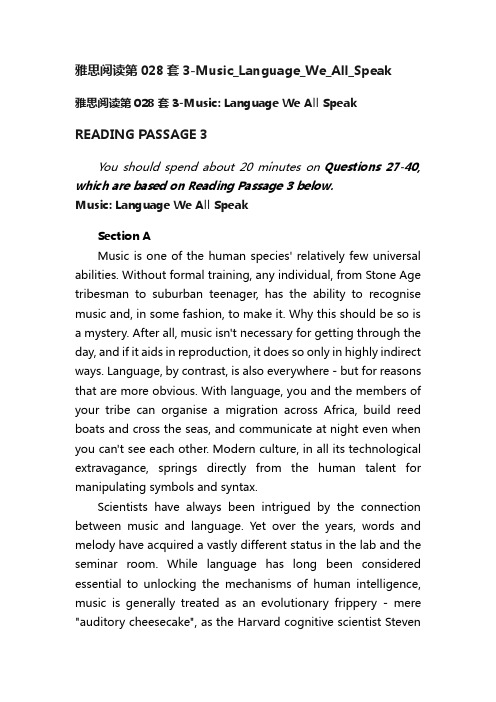
雅思阅读第028套3-Music_Language_We_All_Speak雅思阅读第028套3-Music: Language We All Speak READING PASSAGE 3You should spend about 20 minutes on Questions 27-40, which are based on Reading Passage 3 below.Music: Language We All SpeakSection AMusic is one of the human species' relatively few universal abilities. Without formal training, any individual, from Stone Age tribesman to suburban teenager, has the ability to recognise music and, in some fashion, to make it. Why this should be so is a mystery. After all, music isn't necessary for getting through the day, and if it aids in reproduction, it does so only in highly indirect ways. Language, by contrast, is also everywhere - but for reasons that are more obvious. With language, you and the members of your tribe can organise a migration across Africa, build reed boats and cross the seas, and communicate at night even when you can't see each other. Modern culture, in all its technological extravagance, springs directly from the human talent for manipulating symbols and syntax.Scientists have always been intrigued by the connection between music and language. Yet over the years, words and melody have acquired a vastly different status in the lab and the seminar room. While language has long been considered essential to unlocking the mechanisms of human intelligence, music is generally treated as an evolutionary frippery - mere "auditory cheesecake", as the Harvard cognitive scientist StevenPinker puts it.Section BBut thanks to a decade-long wave of neuroscience research, that tune is changing. A flurry of recent publications suggests that language and music may equally be able to tell us who we are and where we're from - not just emotionally, but biologically. In July, the journal Nature Neuroscience devoted a special issue to the topic. And in an article in the 6 August issue of the Journal of Neuroscience, David Schwartz, Catherine Howe, and Dale Purves of Duke University argued that the sounds of music and the sounds of language are intricately connected.To grasp the originality of this idea, it's necessary to realise two things about how music has traditionally been understood. First, musicologists have long emphasised that while each culture stamps a special identity onto its music, music itself has some universal qualities. For example, in virtually all cultures, sound is divided into some or all of the 12 intervals that make up the chromatic scale -that is, the scale represented by the keys on a piano. For centuries, observers have attributed this preference for certain combinations of tones to the mathematical properties of sound itself.Some 2,500 years ago, Pythagoras was the first to note a direct relationship between the harmoniousness of a tone combination and the physical dimensions of the object that produced it. For example, a plucked string will always play an octave lower than a similar string half its size, and a fifth lower than a similar string two thirds its length. This link between simple ratios and harmony has influenced music theory ever since.Section CThis music-is-math idea is often accompanied by the notion that music, formally speaking at least, exists apart from the world in which it was created. Writing recently in The New York Review of Books, pianist and critic Charles Rosen discussed the long-standing notion that while painting and sculpture reproduce at least some aspects of the natural world, and writing describes thoughts and feelings we are all familiar with, music is entirely abstracted from the world in which we live. Neither idea is right, according to David Schwartz and his colleagues. Human musical preferences are fundamentally shaped not by elegant algorithms or ratios but by the messy sounds of real life, and of speech in particular – which in turn is shaped by our evolutionary heritage. "The explanation of music, like the explanation of any product of the mind, must be rooted in biology, not in numbers per se," says Schwartz.Schwartz, Howe, and Purves analysed a vast selection of speech sounds from a variety of languages to reveal the underlying patterns common to all utterances. In order to focus only on the raw sounds, they discarded all theories about speech and meaning, and sliced sentences into random bites. Using a database of over 100,000 brief segments of speech, they noted which frequency had the greatest emphasis in each sound. The resulting set of frequencies, they discovered, corresponded closely to the chromatic scale. In short, the building blocks of music are to be found in speech.Far from being abstract, music presents a strange analogue to the patterns created by the sounds of speech. "Music, like visual arts, is rooted in our experience of the natural world," says Schwartz. "It emulates our sound environment in the way that visual arts emulate the visual environment." In music we hear theecho of our basic sound-making instrument - the vocal tract. The explanation for human music is simpler still than Pythagoras's mathematical equations: We like the sounds that are familiar to us - specifically, we like the sounds that remind us of us.This brings up some chicken-or-egg evolutionary questions. It may be that music imitates speech directly, the researchers say, in which case it would seem that language evolved first. It's also conceivable that music came first and language is in effect an imitation of song - that in everyday speech we hit the musical notes we especially like. Alternately, it may be that music imitates the general products of the human sound-making system, which just happens to be mostly speech. "We can't know this," says Schwartz. "What we do know is that they both come from the same system, and it is this that shapes our preferences."Section DSchwartz's study also casts light on the long-running question of whether animals understand or appreciate music. Despite the apparent abundance of "music" in the natural world - birdsong, whalesong, wolf howls, synchronised chimpanzee hooting - previous studies have found that many laboratory animals don't show a great affinity for the human variety of music making.Marc Hauser and Josh McDermott of Harvard argued in the July issue of Nature Neuroscience that animals don't create or perceive music the way we do. The fact that laboratory monkeys can show recognition of human tunes is evidence, they say, of shared general features of the auditory system, not any specific chimpanzee musical ability. As for birds, those most musical beasts, they generally recognise their own tunes - a narrow repertoire - but don't generate novel melodies like we do. Thereare no avian Mozarts.But what's been played to animals, Schwartz notes, is human music. If animals evolve preferences for sound as we do - based upon the soundscape in which they live - then their "music" would be fundamentally different from ours. In the same way our scales derive from human utterances, a cat's idea of a good tune would derive from yowls and meows. To demonstrate that animals don't appreciate sound the way we do, we'd need evidence that they don't respond to "music" constructed from their own sound environment.Section ENo matter how the connection between language and music is parsed, what is apparent is that our sense of music, even our love for it, is as deeply rooted in our biology and in our brains as language is. This is most obvious with babies, says Sandra Trehub at the University of Toronto, who also published a paper in the Nature Neuroscience special issue.For babies, music and speech are on a continuum. Mothers use musical speech to "regulate infants' emotional states", Trehub says. Regardless of what language they speak, the voice all mothers use with babies is the same: "something between speech and song". This kind of communication "puts the baby in a trancelike state, which may proceed to sleep or extended periods of rapture". So if the babies of the world could understand the latest research on language and music, they probably wouldn't be very surprised. The upshot, says Trehub, is that music may be even more of a necessity than we realise.SECTION 3: QUESTIONS 27-40Questions 27-31Reading Passage 3 has five sections A-E.Choose the correct heading for each section from the list of headings below.Write the correct number i-viii in boxes 27-31 on your answer sheet.27 ____________ Section A28 ____________ Section B29 ____________ Section C30 ____________ Section D31 ____________ Section EQuestions 32-38Look at the following people (Questions 32-38) and the list of statements below.Match each person with the correct statement.Write the correct letter A-G in boxes 32-38 on your answer sheet.32 ____________ Steven Pinker33 ____________ Musicologists34 ____________ Greek philosopher Pythagoras35 ____________ Schwartz, Howe, and Purves36 ____________ Marc Hauser and Josh McDermott37 ____________ Charles Rosen38 ____________ Sandra TrehubQuestions 39-40Choose the correct letter A, B, C or D.Write your answers in boxes 39-40 on your answer sheet.39Why was the study of animal music inconclusive?AAnimals don’t have the same auditory system as humans.BTests on animal music are limited.CAnimals can’t make up new tunes.DThere aren’t enough tests on a wide range of animals.40What is the main theme of this passage?ALanguage and learningBThe evolution of musicCThe role of music in human society DMusic for animals。
雅思写作大作文范文 雅思写作混合类 music音乐.doc

雅思写作大作文范文雅思写作混合类 music音乐今天我们雅思写作大作文范文的系列文章来研究下音乐这一话题。
音乐是人类生活的重要组成部分,我们已经习惯了无聊的时候听音乐、走在路上的时候听音乐、甚至学习的时候听音乐。
同时音乐又有很多类型,有传统音乐(如中国的京剧,或者民歌),有现代音乐(如hip-hop,jazz,民谣)等。
这两种音乐除了表现形式,在重要性上有没有区分呢?今天我们就来看一道关于music音乐的题目。
小编准备了一篇相应的考官范文,以供大家参考。
雅思写作大作文题目There are many different types of music in the world today. Why do we need music? Is the traditional music of a country more important than the international music that is heard everywhere nowadays?当今世界有许多不同类型的音乐。
为什么我们需要音乐?一个国家的传统音乐比现在在世界各地都能听到的国际音乐更重要吗?雅思写作大作文范文开头段It is true that a rich variety of musical styles can be found around the world. Music is a vital part of all human cultures for a range of reasons, and I would argue that traditional music is more important than modern, international music.事实如此,在世界上我们可以找到极其多种多样的音乐类型。
音乐因为一系列原因是所有人类文化的重要组成部分。
我认为传统音乐比现代的、国际化的音乐更加重要。
【优质文档】雅思阅读真题题源 :Music and the Mind-实用word文档 (1页)

【优质文档】雅思阅读真题题源:Music and the Mind-实用word文档本文部分内容来自网络整理,本司不为其真实性负责,如有异议或侵权请及时联系,本司将立即删除!== 本文为word格式,下载后可方便编辑和修改! ==雅思阅读真题题源:Music and the MindMusic is the manifestation of the human spirit , similar to language . Its greatest practitioners have conveyed to mankind things not possible to say in any other language . If we do not want these things to remain dead treasures , we must do our utmost to make the greatest possible number of people understand their idiom . -- Zoltn KodlyRecently a number of reports have appeared that attest to the connection between music and academic achievement . In a study of the ability of fourteen year - old science students in seventeencountries , the top three countries were Hungary , the Netherlands , and Japan . All three include music throughout the curriculum from kindergarten through high school . In the 1960 s , the Kodly systemof music education was instituted in the schools of Hungary as aresult of the outstanding academic achievement of children in its singing schools . Today , there are no third graders who cannot sing on pitch and sing beautifully . In addition , the academic achievement of Hungarian students , especially in math and science , continues to be outstanding . The Netherlands began their music program in 1968, and Japan followed suit by learning from the experience of these other countries .Another report disclosed the fact that the foremost technical designers and engineers in Silicon Valley are almost all practicing musicians .A third report reveals that the schools who produced the highest academic achievement in the United States today are spending 20 to 30% of the day on the arts , with special emphasis on music . Includedare St . Augustine Bronx elementary school , which , as it was aboutto fail in 1984, implemented an intensive music program . Today 90%of the students are reading at or above grade level .。
Unit 9 Music

Howard: Yes. You hear it everywhere, in restaurants, airports, supermarkets, department stores… Bill: In banks, too. I noticed it while we were at the bank today. Lisa: Did you? I didn’t. Howard: You are not supposed to notice it. It’s just there, in the background. It’s supposed to influence your attitudes, and put you in the right mood.
1 1) resபைடு நூலகம்aurants; airports; supermarkets; banks 2) A. attitudes; in the right mood B. A better feeling; the people around the, C. happy; work better 3) A. World War II; happy; calm B. a machine; kinds of music; different times; faster; slower 2 1-7 T F F T T T F
1 1) eases their minds; operations 2) classical; Irish folk music 3) A. reduce tension 2. T F T F F B. 50 male doctors C. Mathematics D. 1st Test: quickly; calmly 2nd Test: chosen for them 3rd Test: the worst E. sleepy
Unit-9-I-like-music-that-I-can-dance-to-Section-B-

I’ve ever heard.
◆ I almost cried along with it
as I listened.
9/18
Paragraph
Supporting details
2 ◆ His mother died when he was very young.
◆ His father died when he
6/18
Paragraph Main idea
1
I was ____ by a
piece of music
named Erquan
Yingyue.
2
Abing lived a very
_____ life.
3
Abing’s musical
skills made him
very ______.
Supporting details The music was strangely beautiful…
5/18
2c Read the passage again and use suitable words to complete the main idea of each paragraph. Then list the supporting details in each paragraph.
16/18
1. 课后阅读短文,试着复述这个故事。 2. Write a passage about Abing and
Erquan Yingyue.
17/18
18/18
7/18
Paragraph
Main idea
1
I was _m__o_v_e_d_ by a piece of
Unit9 I like music that I can dance to 答案 文档 (2)
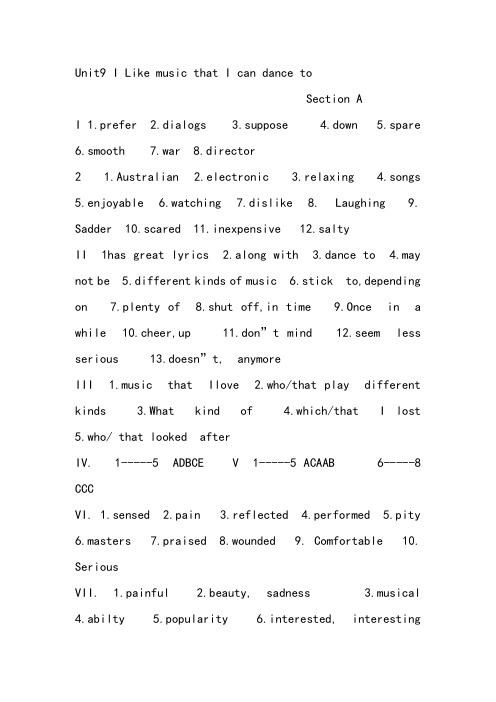
Unit9 I Like music that I can dance toSection AI 1.prefer 2.dialogs 3.suppose 4.down 5.spare6.smooth7.war8.director2 1.Australian 2.electronic 3.relaxing 4.songs5.enjoyable6.watching7.dislike8. Laughing9. Sadder 10.scared 11.inexpensive 12.saltyII 1has great lyrics 2.along with 3.dance to 4.maynot be 5.different kinds of music 6.stick to,dependingon 7.plenty of 8.shut off,in time 9.Once in a while 10.cheer,up 11.don”t mind 12.seem less serious 13.doesn”t, anymoreIII 1.music that Ilove 2.who/that play different kinds 3.What kind of 4.which/that I lost 5.who/ that looked afterIV. 1-----5 ADBCE V 1-----5 ACAAB 6-----8CCCVI. 1.sensed 2.pain 3.reflected 4.performed 5.pity6.masters7.praised8.wounded9. Comfortable 10. SeriousVII. 1.painful 2.beauty, sadness 3.musical4.abilty5.popularity6.interested, interesting7.musicians 8.scaryVIII. 1.looked up 2.in total 3.It is a pity 4.not only, but also 5.folk music 6.which was played on 7.musical instruments,such as 8.one of the national treasures 9.during his lifetime 10.was known for 11. grew worseIX. 1.who/that 2.which/ that 3.which 4. Whose 5.whom 6. ThatX. 1----5 DAGCEXI. 1---5 CABCC 6----9 AEDB 10.yes,it is 11.Four 12.Because music is mathematical, with notes in order. 13.playing music with other people helps chidren to work together 14.The reasons why musicis an important subject that every child should study XII. One possible versionMy friend is Dave. He likes the Backstreet Boys.Because the music they play is energetic.There are many good singers in the band. The singers wear fantastic clothes and they look cool. The music that the band plays always makes him feel excited andenergetic. As for books, he likes Harry potter. Because he thinks it is interesting and exciting. It makes him feel relaxed. As for movies, he likes Titanic. It is a tragedy , and it makes him feel sad. But he thinks it is moving as well.。
原创雅思口语现成答案,音乐手机电影电视
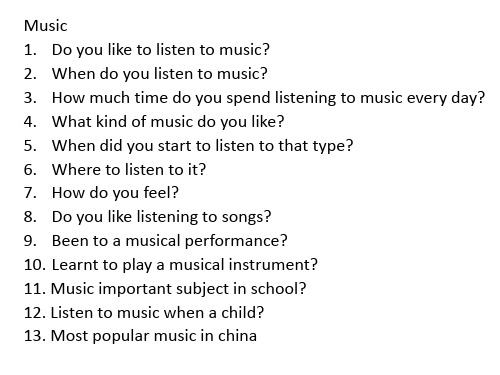
1. 喜欢听音乐
Like listening to music? Yes, I do. Listen to music on my MP4 when I am travelling from place to place. Or en I’m home and relaxing. Most love the time when lying in the fluffy sofa and reading a book or eat something. In a café with graceful environment and magnificent background music Yet,I am not much of a singer/ a born singer
Even though the radiation waves can cause some harms to our health, the machine is still irreplaceable in terms of the convenience it brings to us.
Cell phones can save my life. For example, in winter, when my family goes to another city like Montreal, I would call for help if the car broke down in the middle of nowhere in Quebec. Or we may freeze to death.
Can you play a kind of instrument? Never played any before Maybe it’s fun, but I am not that musically talented. / not much of a musician Help to relieve stress/send special messages I really admire the guys who can play the guitar or piano well. The playing skills are highly required Its unique sound is a great beauty A kind of unspeakable beauty there can be a resonance at my heartstrings. It really kills your thoughts
雅思口语题库Part 1 范文:音乐Music
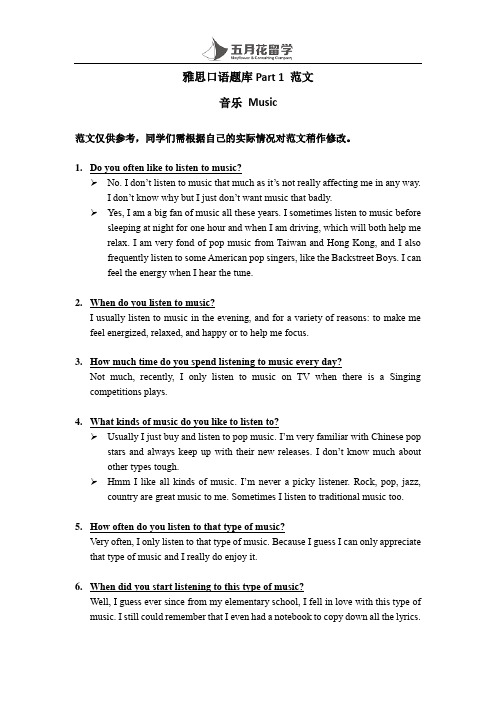
雅思口语题库Part 1 范文音乐Music范文仅供参考,同学们需根据自己的实际情况对范文稍作修改。
1.Do you often like to listen to music?No. I don’t listen to music that much as it’s not really affecting me in any way.I don’t know why but I just don’t want music that badly.Yes, I am a big fan of music all these years. I sometimes listen to music before sleeping at night for one hour and when I am driving, which will both help me relax. I am very fond of pop music from Taiwan and Hong Kong, andI also frequently listen to some American pop singers, like the BackstreetBoys. I can feel the energy when I hear the tune.2.When do you listen to music?I usually listen to music in the evening, and for a variety of reasons: to make mefeel energized, relaxed, and happy or to help me focus.3.How much time do you spend listening to music every day?Not much, recently, I only listen to music on TV when there is a Singing competitions plays.4.What kinds of music do you like to listen to?Usually I just buy and listen to pop music. I’m very familiar with Chinese pop stars and always keep up with their new releases. I don’t know much about other types tough.Hmm I like all kinds of music. I’m never a picky listener. Rock, pop, jazz, country are great music to me. Sometimes I listen to traditional music too.5.How often do you listen to that type of music?Very often, I only listen to that type of music. Because I guess I can only appreciate that type of music and I really do enjoy it.6.When did you start listening to this type of music?Well, I guess ever since from my elementary school, I fell in love with this type of music. I still could remember that I even had a notebook to copy down all the lyrics.7.Where do you listen to it?I think I first listened to it was in my home through a radio. I was attracted andfascinated by that melody coming through the radio.8.Have you ever been to a musical performance/concert?No, never. Concert tickets are really expensive. I have heard that a good seat may cost 1000 RMB which is about my monthly expense, so I never went to a concert before.未完待续,敬请期待!。
Unit-9-I-like-music-that-I-can-dance-to

乐。
_W__h_a_t _k_in__d_ _o_f__ music do you like? I love music t_h_a_t_/w__h_ic_h_ I can _si_n_g_a_l_o_n_g _w_i_th. 2)许飞喜欢哪种乐队? 他更喜欢演奏宁静慢 节奏歌曲乐队。
What kind of _g_ro_u__p_s _d_o_e_s_ Xu Fei like?
He _p__re_f_e_r_s_ groups _th__a_t _/w__h_ic_h_ _p_l_a_y_ quiet and slow songs.
19/33
3)你喜欢哪种电影? 我更喜欢给我带来思索 电影。 W__h_a_t__k_in_d__o_f_m__o_v_ie_s__d_o_y_o_u__li_k_e___? I _p_r_e_f_er_ movies t_h_a_t_/_w__h_ic_h_ _g_i_v_e_ _m_e_ s_o_m__e_th_i_n_g_ _to_ t_h_i_n_k_ a_b_o_u_t_.
these movies?
Relaxed.
12/33
Task5.Read the 3rd passage and answer the questions
1.What kinds of movies doesn’t the writer prefer to watch when he or she is down or tired?
Unit9 What kind of music do you likeSection Section B-2a-2e

2. I sensed a strong sadness and pain. sense “感觉;意识到”
pain n. 痛苦;苦恼 He has a pain in the knee. 他膝盖痛。 No pains, no gains. 不劳则无获。 painful adj. 痛苦的;疼痛的;费力的
1. Which musician does the reading passage mainly talk about?
Abing. 2. What is the name of his most famous piece of music? Erquan Yingyue (Moon Reflected on Second Spring).
3. How does the writer feel about this piece of music? He feels that it is sad but beautiful, and it not only paints a picture of Abing’s own life but also makes people recall their deepest wounds from their own sad or painful experiences.
1. The piece which was played on the erhu especially moved me. move在这里的意思是“感动;打动” move v. 推动;(使)移动;搬家 n. 移动;步骤;迁居;动作 He is going to move his furniture. 他打算把家具移动一下位置。 We are moving next week. 我们下星期搬家。
雅思阅读预测真题库2解析

Music:language we all speak背景词汇:Intervals n间隔Harmoniousness n和谐Ratios n比例Algorithms n算法Emulate n反射;回声Sculpture n雕塑Underlying adj.潜在的Affinity n密切关系Intrigue v密谋Evolutionary adj进化的Frippery n无用的东西Neuroscience 神经系统同义替换:27-31 list of heading27、music isn’t necessary for getting through the day,, and if it aids in reproduction, it does so only in highly direct ways.Scientists have always been intrigued by the connection between music and language28、some 2,500 years ago, Pythagoras was the first to note a direct relationship between the harmoniousness of a tone combination.29、This music is mouth idea is often accompanied by the notion that music formally speaking at least.30、Previous studies have found that many laboratory animals don’t show a great affinity for the human variety of music31、Is as deeply rooted in our biology and in our brains as language is.Regardless of what language they speak the voice all mothers use with babies is the same,something between speech and song.32-38 人物信息matching32、对应在section A第三段:while language has long been considered essential to unlocking the mechanisms of human intelligence.33、对应在B的第二段:Musicologists have long emphasized that while each culture stamps a special identity onto its music;music it self has some universal qualities.=common feature despite cultural influences on it34、对应在B段第三段:Pythagoras was the first to note a direct relationship between the harmoniousness of a tone combination and the physical dimensions of the object that produced it35、对应在C段第一段:the explanation of music , like the explanation of any product of the mind, must be rooted in biology, not in numbers per se.36、对应在D段第二段:Marc Hauser and Josh Mcdermott of Harvard argued in the July issue of Nature Neuroscience that animals don’t create or perceive music the way we do37、对应在C段第一段:Charles Rosen discussed the long------standingnotion that while painting and sculpture reproduce, at least some aspects of the natural world, and writing describes thoughts and feelings we are all familiar with music is entirely abstracted from the world in which we live.38、对应在E段第二段:for babies,music and speech are on a continuum. Mother use musical speech to regulate infants emotional states.39、40、根据主题:the function of music in human societyFacial Expression28-33段落信息matching28、对应在C段:some faces are often falsely read as expressing some emotion, even when they are neutral,.....29、对应在A段:facial expressions are a from of nonverbal communication....but also occur in most other mammals and some other animal species.30、对应在D段:he supports his data with statistics on the relation between the blink rates of presidential candidates and their success in their races31、对应在H段:findings on contempt(which is social)are less clear, though there is at least some preliminary evidence that this emotion and its expression are universally recognized.32、对应在D段:Nervousness can also be measured by examining each candidate’ s perspiration, eye contact and stiffness.34-38 Summary34、对应在G段:the study concluded that certain facial expressions correspond to particular emotions and cannot be covered.=be related to36-38对应在G段:regardless of cultural background, and regardless of whether or not the culture has been isolated or exposed to the mainstream39-40 多选题略Biomimetic Design背景词汇:同义替换:1-5 判断题:1、对应在A段:parker had come here to discover precisely how it does this, not from surly biological interest, but with a concrete purpose in mind......NG2、对应在A段:thewater’s spreading out incredibly fast....Its skin is far more hydrophobic than I thought.\3、对应在4、对应在E段:in reality, gecko feet aren’t sticky---they’re dry and smooth to the touch---and owe their remarkable adhesion to some two billion.spatula-tipped filaments per square centimeter on their toe pads, each filament only a hundred nanometers thick.5、NG6、对应在最后一段:For all the power of the biomimetics paradigm, and the brilliant people who practice it , bio-inspiration has led to surprisingly few mass-produced products and arguably only on e houshold word-----velcro7、对应在最后一段:Velcro, which wa填空题8-138、9、对应在D段:it rumples if you breathe on it and must be reinforced with carbon-fiber spars.10、对应在F段:he also crafted Stickybot’s legs and feet with a process he calls shape deposition manufacturing.11、对应在G段:Stickybot now walks up vertical surfaces of glass, plastic and glazed ceramic.12、对应在G段:the department of defense’s defense advanced research projects agency(DARPA), which funds the project, ha it in mind for surveillance13、对应在G段:I would like to see Stiekybot have a real-world function. Whether it’s a toy or another application. Sure, it would be great if it eventually has lifesavingor humanitarian roleTV Addiction背景词汇:同义替换:14-17 判断题14、对应在A段:Even researchers who study TV for a living marvel at the medium’s hold on them personally.15、对应在A段最后一句:Less attention has been paid to the basic allure of the small screen-----the medium, as opposed to the message16、对应在B段第一句:the term”TV addiction” is imprecise and laden with value judgments, but it captures the essence of a very real phenomenon.17、NG18-20多选题21-24人物信息matching21、对应在A段:Percy Tannenbaum of the University of California at Berkeley has written:”Among life ‘s more embarrassing moments have been countless occasions when I am engaged in conversation in a room while a TV set is on....’22、对应在E段:the attraction seems to spring from our biological“orienting response”First described by Ivan Pavlov in 192723、对应在F段:Esther Thorson of the University of Missouri and their colleagues began to study whether the simple formal features of television24、对应在G段:Annie Lang’s research team at Indiana University has shown that heart rate decreases for four to six seconds after an orienting stimulus25-27 summary25、对应在A段:however stands out for its prominence and ubiquity---the world’s most popular pastime.26、对应在Theory of mind in children14-20人物信息matching14、对应在H段:Schatz studied the spontaneous speech of three-year-olds and found that these children used mental terms.15、对应在B段:Most children under four years gave the incorrect answer that Maxi will look in the green cupboard.16、对应在F段:Lewis investigated older children living in extended families in Crete and Cyprus. They found that children who socially interact with more adults, who have more friends.17、对应在C段:younger children may have been affected by the complexity and too much information of the story in the task described above.=sophisticated reasoning18、对应在E段:Meins and her colleagues have found that what they term mindmindedness in maternal speech to six-month old infants is related to both security o attachment and to TOM abilities.19、对应在F段:young children are more likely to talk about their thoughts and feeling with peers than with their mother.20、对应在最后一段:a different explanation has been put forward by Harris. Summary 21-2721、对应在A段:A considerable amount of research since the mid 1980s has been concerned with what has been termed children ’s theory of mind.22、对应在B段:Maxi left some chocolate in a blue cupboard before he went out.23、对应在B段:Most children under four years gave the incorrect answer that Maxi will look in the green cupboard.24、对应在C段:most normally-developing children are unable to pass the tasks until around age four25、对应在F段:Lewis investigated older children living in extended families in Crete and Cyprus26、对应在F段:They found that children who socially interact with more adults27、对应在F段:it is likely to be more challenging because other children.....Lost tribes of the green Sahara背景词汇Realm n领域Scatter v 分散Rovers n 漫游者Dune n沙丘Inexorable adj 无情的Wick 依靠毛细作用Intermittent 间歇地adjHead off 阻止Desolate 荒无人烟的adjAcquaint with 与...熟悉Skeptical adj 怀疑Interloper 闯入者Intrigue adj好奇的Burial n 埋葬Excavate v 挖掘Strenuous 紧张的Femur 大腿骨Perceptible 可察觉的adjHerder 牧人同义替换:1-3判断题1、对应在4-6简答题7-13summaryCompany Innovation背景词汇:Subscriber 捐献者nProspect 希望;前景nGauge n. 测量仪器;测量标准Innovative 创新的;革命的adj innovation 创新n Merger n (企业等的)合并Consultant n 顾问,咨询者Venture capital n风险投资Entrepreneur n 企业家Pharmaceutical 药物的;制药的adjClinical trials 临床试验Cannibalization n.为修配而拆用旧设备的部件Intrapreneurs n 企业内部强人Property n财产Revenue n税收Shareholder n股东Branches n分支同义替换:28-33 段落信息matching28、F段: devolving power and setting up internal ideas-factories and tracking stocks so that talented staff will not leave.=retain best employees29、C段:trading intangible assets=innovation 无形的财产30、30、G段:....can hinder the sort of innovative behaviour31、B段:The stars of American business tend today to be innovators such as Dell, Amazon and Wal-Mart.=Example of three famous American32、F段:Procter&Gamble is now shifting its entire business focus from countries to products=change its concentration33、E: with plenty of cheap venture capital.....entrepreneurs can conduct early-stage research, selling out to the big firms when they reach expensive.34-37 判断34.对应A段第四行:U magic Systems is a young firm, setting up websites that will allow clients to consult the virtual versions of these personalities=new representative of....35.对应B段第五行:Amazon and Wal-mart, which have produced ideas or products that have changed their industries 不同于e xchanged their innovation experience36.对应 E段take it first to a big company.和题目small company不相符37.对应I段:he tried to hawk his ‘virtual experts’ idea three years ago to the idea labs of firms such as IBM hawk v 兜售38-40 选择38.对应C段倒数第三行trading in intangible assets in the United States has risen from $15 billion 1990 to $100 billion in 1998, with an increasing proportion of the rewards going to small firms and individuals =It is getting more important39.对应D段:In the management of creativity, size is your enemy.文中又举例:大小公司的时间对比:Gillette spent ten years ....It took a British supermarket only a year or so...40对应I段:Sceptical=uncertain含糊的;怀疑的Making copes背景词汇:Clay tablets n黏土便笺Facsimile n传真;复写Press n印刷机Antiques store n古董店Copying press n复印机Typewriter n打字机Carbon paper n 复写纸Shining infrared light n红外线Triumph n成功Ink n 墨水Document n 文件;文档Xerography n 静电复印技术;静电射线透照术Billboard n 宣传板;广告牌Duplicate v 复制stylus 铁笔nPortable adj 便携的Reproducible adj 可再生的同义替换:14-19 判断14、对应在A段第四行:when the Sumerians firstly transposed spoken words into stylus marks on clay tablets. 题目所提到papyrus 纸莎草纸n15、对应在B段:NG 没有提到关于时间的对比和先后顺序16、对应在C段:the machines were displaced, Beginning in the late 1800s...NG17、对应在D段:these machines and their successors were welcomed by secretaries18、对应在D段倒数第三行:All required expensive chemically treated papers.Expensive=costly19、对应在E段倒数第五行:unlike its numerous competitors made sharp,permanent copies on ordinary paperNumerous competitors=earlier copying inventions ordinary paper=plain20-26 summary20对应在E段第二行:introduced its first xerographic, which it called the Model A With many drawbacks=comically difficult to operate21对应在F段第一行:conceive=propose 构想22对应在F段中间:major=big23对应在F段: Carlson’s invention was indeed a commercial triumph24由数字10对应在G段:when he was 10,his favorite possession was a toy typewriter.When he was 10= at the age of 10 fancy=favorite25由New York定位到G段:he would learn there might be useful to him when he became an inventor26对应在G段:his charities business during the final decade of his life was prodigiousLanguage strategy in Multinational company背景词汇:Harmonization n 和谐;融洽Negotiation n 谈判;转让Allowance n. 津贴Vulnerable n.易受攻击的Bonding 结合的Frustration n挫折Functional multilingualism 功能性的多语言Pidgin 详细Transaction n交易Legislation n 方法Aspiration n 渴望;抱负Ambiguity n 含糊Rhetorical 修辞的Pre-requisite n 提前必不可少的东西Negotiation n 谈判Endeavour v努力同义替换:27-32选择类型matching27、对应在B段:a survey of British exporting companies found that over a third used English 3exclusively in dealing with foreign customers.28、29、对应在C段:relying on a mix of languages, pidgins and gestures to communication being regular punctuated.30、对应在C段:16% of international business transaction:are conducted in a cocktail of Languages.31、32、对应在D段:these can be very expensive with a top simultaneous.32、对应在D段:they will of course endeavor to provide a hi-fidelity translation but in this circumstance the interpreter and guess work.33-39 简答题:33、Proto-writing背景词汇:Quipu n古秘鲁人的结绳文字Tally n 帐;记分Ice Age Symbol 冰川时代标志Amerindian pictograms 象形文字Clay tokens 黏土象征Conifer 针叶树Flock paper 毛面纸Excavation n 挖掘Bulla n 垂饰Proto n 原型Decimal system n 小数单位Imperial clerk 帝国职员Notch n刻痕;凹口;峡谷Knot n绳子结Calendar n日历Boulder n卵石Lunar notation n 月亮标记Civilization n 文明Script n 脚本答案更正:28 B29 D30 A31 C32 B33 C34 D35 FALSE36 TRUE37 NOT GIVEN38 TRUE39 NOT GIVEN40 FALSEEducation Philosophy of Children背景词汇:Statistic n 数据Pre-industrial 未工业化的Agrarian economy 农耕经济nMiddle class n 中产阶级Industrial Revolution 工业革命Psychology 心理学Feral children 野孩儿Civilize v使开化Kindergarten n 幼儿园Innocent n 无辜的;清白的Infancy n婴儿期;幼儿infant 婴儿nHomelike adj 在自己家似的Mute n 哑巴; adj哑的,沉默的Naked adj裸体的Embark on....走向Philosophy n哲学同义替换段落信息matching1、A段:对应在第三行:there is evidence that as many as 30 percent of all children died before they were 14 days old.2、C段: his writings on the role of government are seen as foundational to many political movements and activities .....His ideas are equally foundatioanl to several areas of psychology.Politics=political movements3.D段:Jean Jacquesd Rousseau lived during an era of ......Johan Heinrich Pestalozz lived during the early stages of ....=two famous educator4、E段:one of the best documented cases of all the so-called feral children concerned a young man who was captured in a small town in the south of .....Feral children=wild kid5-8 年代信息matching5、对应在B段:for the poorest children, ....as additional in come was needed to help support the family and young children were forced into early employment.=need to work6、对应C段:coupled with the creation of a middle class and the redefinition of roles of family members 1800s7、对应F段:By the time of Froebel’s death in 1852, dozens of kindergartens had created in Germany.8、对应F段:their use increased in Europe and the movement eventually reached and flourished in the United Stated in 20th century人物信息matching9-129、对应在E段倒数第四行:But, after five years and despite all of his efforts, Itard considered the experiment to be a failure=not successful10、对应D段Rousseau observed children and adolescents extensively and spoke of children’s individuality but he based much of his developmental theory on observation in writing the book11、对应B段:the theory was designed to create a emotionally healthy homelike learning environment=promote some emotional activities between school and family 12、对应D段:In the original state of nature,...people were “noble savages”, innocent,free and uncorrupted=corruption is not a characteristic。
关于music的free talk雅思
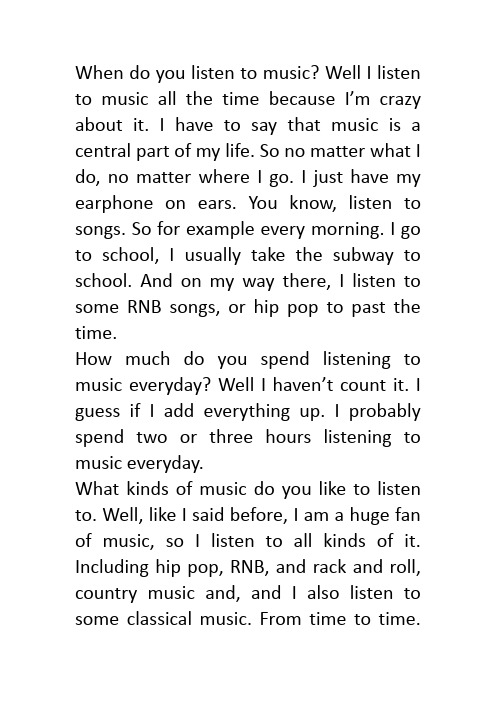
When do you listen to music? Well I listen to music all the time because I’m crazy about it. I have to say that music is a central part of my life. So no matter what I do, no matter where I go. I just have my earphone on ears. You know, listen to songs. So for example every morning. I go to school, I usually take the subway to school. And on my way there, I listen to some RNB songs, or hip pop to past the time.How much do you spend listening to music everyday? Well I haven’t count it.I guess if I add everything up. Iprobably spend two or three hours listening to music everyday.What kinds of music do you like to listen to. Well, like I said before, I am a huge fan of music, so I listen to all kinds of it. Including hip pop, RNB, and rack and roll, country music and, and I also listen to some classical music. From time to time. But if I have to pick my favourite I suppose maybe it should be country music. Especially when I’m down in the dumps, I just listen to some country songs. Especially Taylor Swift songs. Her music is really therapeutic Ithink.Have you ever been to a concert before?Yes, I have. I have been to tons of concerts. And last time I went to one was three or four months ago. I went to Julin’s concert in Shanghai. Julin is a household name in China. I really adore her. So I went there with my mom, who loves Julin as well. We had the time of our lives that day.。
Unit 9 I like music that I can dance to含答案、听力原文及音频
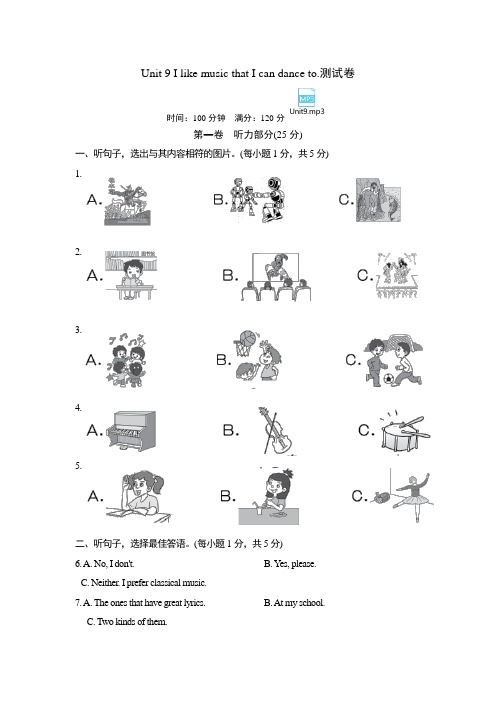
Unit 9 I like music that I can dance to.测试卷Unit9.mp3时间:100分钟满分:120分第一卷听力部分(25分)一、听句子,选出与其内容相符的图片。
(每小题1分,共5分)1.2.3.4.5.二、听句子,选择最佳答语。
(每小题1分,共5分)6. A. No, I don't. B. Y es, please.C. Neither. I prefer classical music.7. A. The ones that have great lyrics. B. At my school.C. Two kinds of them.8. A. Y ou're welcome. B. Never mind.C. Sorry, I have a piano lesson.9. A. I think so. B. I enjoy it very much.C. It's about the fox and the cock.10. A. Y es, I do. B. Jet Li does.C. They don't wear cool clothes.三、听短对话,选择最佳答案。
(每小题1分,共5分)11. What's Andy's favorite music?A. Country music.B. Rock music.C. Pop music.12. What food does Tony like better?A. Pizzas.B. Hamburgers.C. Sandwiches.13. What are the two speakers talking about?A. The result of an exam.B. The ending of a drama.C. The history of a school.14. What kind of movies does Jane's little brother like?A. Action movies.B. Scary movies.C. Comedies.15. Who gave Jessica the guitar?A. Her brother.B. Her father.C. Her uncle.四、听长对话,选择最佳答案。
- 1、下载文档前请自行甄别文档内容的完整性,平台不提供额外的编辑、内容补充、找答案等附加服务。
- 2、"仅部分预览"的文档,不可在线预览部分如存在完整性等问题,可反馈申请退款(可完整预览的文档不适用该条件!)。
- 3、如文档侵犯您的权益,请联系客服反馈,我们会尽快为您处理(人工客服工作时间:9:00-18:30)。
Unit 9 MusicPassage 55When students and parents are asked to rate subjects according to their importance, the arts are unavoidably at the bottom of the list. Music is nice, people seem to say, but not important. Too often it is viewed as mere entertainment, but certainly not an education priority(优先). This view is shortsighted. In fact, music education is beneficial and important for all students.Music tells us who we are. Because music is an expression of the beings who create it, it reflects their thinking and values, as well ad the social environment it came influence that George Gershwin and other musicians introduced into their music is obviously American because it came from American musical traditions. Music expresses our character and values. It gives us identity as a society.Music provides a kind of perception(感知)that cannot be acquired any other way. Science can explain how the sun rises and sets. The arts explore the emotive(情感的)meaning of the same phenomenon. We need every possible way to discover and respond to our world for one simple but powerful reason: No one way can get it all.The arts are forms of thought as powerful in what they communicate as mathematical and scientific symbols. They are ways we human beings “talk” to each other. They are the language of civilization through which we express our fears, our curiosities, our hungers, our discoveries, our hopes. The arts are ways we give form to our ideas and imagination so that they can be shared with others. When we do not give children access to an important way of expressing themselves such as music, we take away from them the meanings that music expresses.Science and technology do not tell us what it means to be human. The arts do. Music is an important way we express human suffering, celebration, the meaning and value of peace and love.So music education is far more necessary than people seem to realize.小试牛刀:Question1-5:Do the following statements agree with the views of the writer in the passage?Choose fromYES if the statement agrees with the writer’s claimsNO if the statement contradicts the writer’s claimsNOT GIVEN if it is impossible to say what the writer thinks about this1. People all seem to know that music is not only an entertainment ,but also a kind ofbeneficial education to students.2. Music is actually a representation of creators’ thinking and values.3. Comparing with science,the art can express human beings’ needs better.4. Science and arts explore different aspects of things, and both of them areindispensable for us to discover and respond to our world.5. Music education is far more necessary than science and technology education.Passage 56It has been thought and said that Africans are born with musical talent. Because music is so important in the lives of many Africans and because so much music is performed in Africa, we are inclined to think that all Africans are musicians. The impression is strengthened when we look at ourselves and find that we have become largely a society of musical spectators (旁观者). Music is important to us, but most of us can be considered consumers rather than producers of music. We have records, television, concerts, and radio to fulfill many of our musical needs. In most situations where music is performed in our culture, it is not difficult to distinguish the audience from the performers, but such is often not the case in Africa. Alban Ayipaga, a Kasena semiprofessional musician from northern Ghana, says that when his flute (长笛) and drum ensemble (歌舞团) is performing, “anybod y can take part". This is true, but Kasena musicians recognize that not all people are equally capable of taking part in the music. Some can sing along with the drummers, but relatively few can drum and even fewer can play the flute along with the ensemble. It is fairly common in Africa for there to be an ensemble of expert musicians surrounded by others who join in by clapping, singing, or somehow, adding to the totality of musical sound. Performances often take place in an open area (that is, not on a stage) and so the lines between the performing nucleus and the additional performers, active spectators, and passive spectators may be difficult to draw from our point of view.小试牛刀:Question1-5:Complete the table below using information from the above text.Write NO MORE THAN THREE WORDS from the passage for each answer.Different Viewpoints on MusicRoles Played in Music Appreciation of MusicCommon People Musical spectators,1, ratherthan producershave records,television,concerts,andradio to 2, musicalneeds.Not difficult to distinguish the audienceFrom the 3,Africans All people are equally capableof 4, themusicAudience join in the playing by5, ,singing, orsomehow adding to the totality ofmusical sound.。
